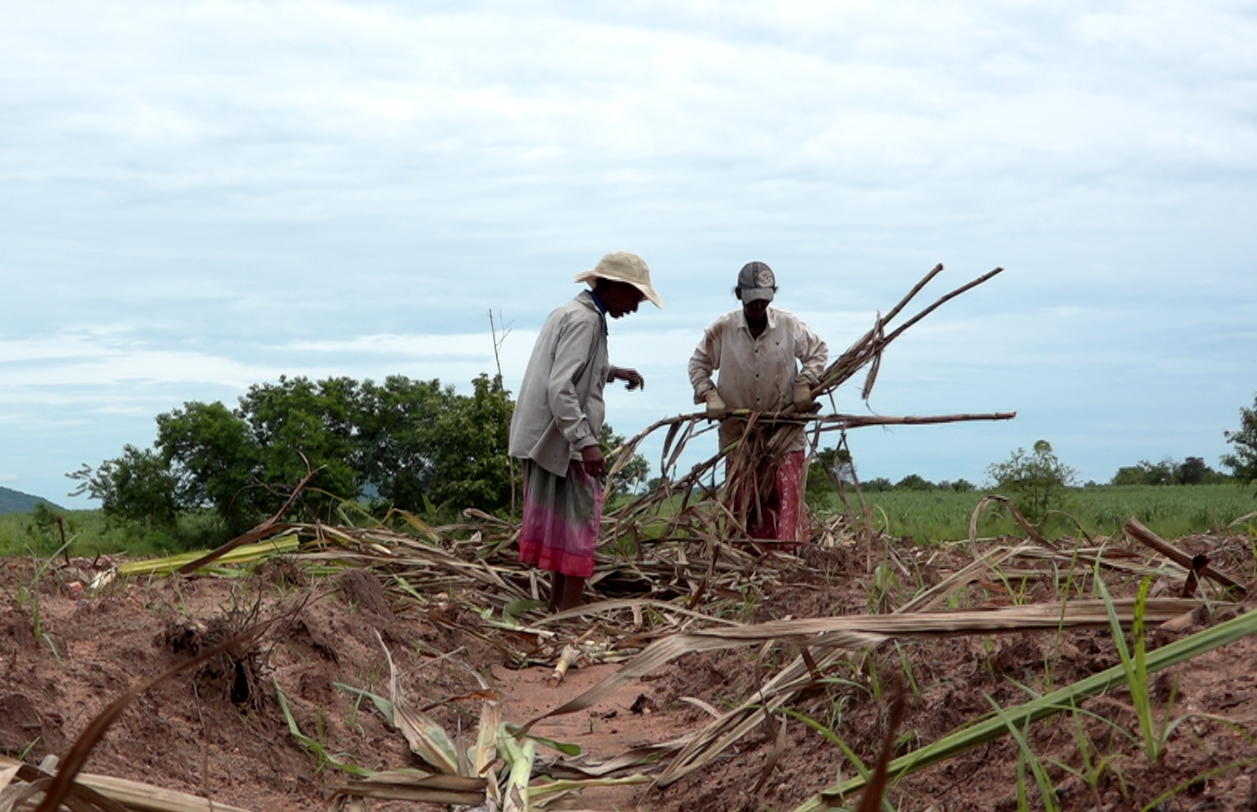Structural Adjustment of Women’s Labour in Agriculture in Sri Lanka
Buddhima Padmasiri
Women’s empowerment through employment is not a new focus for international financial institutions and development agencies. It was also among the objectives of the ‘structural adjustment’ programmes introduced by the International Monetary Fund (IMF) and World Bank (WB) in the Global South during the 1970s (Campbell 2010). As many scholars point out, these initiatives had massive implications for women’s labour (Federici 2004, 2018; Mies 1986; Standing 1999). In particular, these programmes contributed to the increasing commodification of women’s labour; “new forms of primitive accumulation”; creation of an unprotected labour force; and a new sexual division of labour that further subordinated women (Federici 2004: 12; 2018).
In agrarian economies, these policy shifts significantly changed rural production systems, and the relationship between women’s labour and capital, with feminisation of labour and by the gender-segregated identification of both women’s work and labour (Sen 1999). New avenues for women’s employment opened, not limited to export manufacturing alone. In the agricultural sector, women were employed in “large-scale export-oriented cash crop production” in plantations, as unpaid family workers in small-scale peasant units and cooperatives, and as casual labourers in agricultural companies (Mies 1986: 115).
In this contribution[i], I discuss the changes in women’s waged labour in Sri Lanka following the liberalisation of the economy in 1978 and the introduction of structural adjustment reforms. Taking a case study from Monaragala district, I will look at the commodification of women’s labour in agriculture, and the exploitative nature of that labour.
‘Contributing Family Worker’
Women’s contribution to the agricultural economy in most countries is under-represented, unrecognised, and not valued in national income accounting (Mies 1986: 115). Despite the crucial role played by women in subsistence production, which is women producing food for their consumption at home, they are categorised mainly as “dependents”. If we take Sri Lanka for an example, women’s contribution to agriculture is mainly classified as “Contributing Family Worker”. In 2020, women comprised 76.61% of all those in this category (Department of Census and Statistics 2021: 78).
In Monaragala district, agriculture is still the primary source of livelihood. Even today, women farmers are engaged in chena cultivation and home gardening, as an essential aspect of women’s subsistence economy and social reproduction activities. In contrast, male farmers associate themselves more with paddy cultivation, which requires land ownership and access to seeds, water, fertiliser, etc. As witnessed during fieldwork and as noted by government officials, farmers, and activists, men concentrate on economic profitability and hence their cultivation tends to depend heavily on agrochemicals; while women engage in subsistence farming using agroecological practices, with better use of the natural environment and lesser impact on natural resources.
Monaragala was one of the first districts subjected to foreign capital investment under a State-sponsored agrarian development programme in the early 1980s. Under IMF and WB funding, an Agricultural Promotion Zone (APZ) was introduced as part of these reforms (Shanmugaratnam 1987; Gunasinghe 1986, 2011; Karunan 1992), which provided incentives for private investors. The establishment of the APZs led to the expansion of agricultural industries and investment of private capital in the district, first by Booker International, followed by Mehta International, and H.V.A. International Ltd., which led to the establishment of three sugar companies, including the Pelwatte Sugar Company (PSC) (Karunan 1992). Thirty years since, up till now, we see more agribusiness operations (with State patronage) in these areas, targeting both the export industry and local markets.
Pelwatte Sugar Company, the largest manufacturer in the country, was set up in 1984 with the investment of Booker Agriculture International Ltd., a British-owned transnational company. Booker was granted a 10-year tax holiday, duty-free machinery imports facilities, and an income tax exemption (Karunan 1992).
In the early 1980s, the sugar companies took over people’s customary lands, and State lands previously accessible to villagers, to set up sugar plantations and factories. These led to the clearing of cultivated land and forest land (Karunan 1992). As a result, formerly independent farmers became wage labourers in plots of land allocated to them by the sugar company as “out grower farmers”. The farmers cultivate on land leased or owned by the company, and sell their produce to the company, at a price determined by the buyer. These contributed to changes in the traditional lifestyle of the people based on chena and paddy cultivation, and led to an increase in the proletarianisation and commodification of labour (Gunewardena 2010).
Women’s Waged Labour
In this context, and in the absence of livelihood alternatives, women started being employed as daily wage earners by the Pelwatte Sugar Company. This ‘choice’ of plantation agriculture, was despite its long hours, poor working conditions, and low wages, without social protection for casual workers. Even though the contribution of women is crucial for the industry, they are categorised as unskilled, unproductive and secondary labour, subordinated to male control. The new commodification of labour has also created new gender-stratified labour hierarchies, leading to the creation of new forms of gender disparities centring on the sugar industry (Gunewardena 2010).
In 2021 there was a policy decision to absorb workers who had worked for more than five years without taking leave into the permanent workforce (interview with a worker, 17 July 2022). As reported by the management, this was done as a means of sorting out issues faced by workers and to motivate them (Kirinde 2022; Ali Ahalam 2021). During my fieldwork, I met a woman who having worked at Pelwatte for more than 15 years, had only been made permanent in 2021. When she started employment in 2007, she had received around LKR160 as a daily wage. According to her, the only change in becoming permanent is she can now go on no-pay leave, while earlier, if she missed three workdays in a week, she would lose her job. Permanent workers are also entitled to medical leave and benefits which non-permanent workers are not. There had been workers in the same employment for more than 22 years, whom the company had not made permanent until this policy decision.
Initially, the daily wage at the Pelwatte Sugar Company (PSC) was LKR33. As of November 2022, it is LKR1200. The increase over time is a result of workers’ struggles. In the current economic crisis, the PSC worker I spoke to said that she could not survive on her salary alone. So, on Sundays, she works as a daily wage worker elsewhere. Also, with the fuel shortage during the time of the interview, the Company was not transporting workers to the plantation. While the permanent workers received a basic salary of LKR19,000 even when they could not report to work due to transport issues, non-permanent workers who had no guaranteed minimum salary were having to find some way of getting to work – to retain their employment, and secure an income for the day. This in general shows the precariousness of non-permanent employment, and the disparity between the two types of employment.
New Multinationals and the Continuation of Precarity
Over time, new multinational companies such as Dole, a large-scale agricultural company producing bananas for both the local and foreign markets, have been set up in Monaragala. There are also a few local companies like Nelna present in the area. Companies such as Dole have been complicit in many issues such as land grabbing and labour rights violations (Sanjeeva 2016a, 2016b, 2016c).
Women in the area find employment in these companies due to poverty, conditioned by the lack of access to resources such as land. These companies employ women as agency-hired employees, which means in-sourced labour, which is a precarious form of employment. They are paid every other week, based on their attendance. Labour rights violations and non-payment of Employees Provident Fund and Employees Trust Fund statutory dues by manpower agencies have been reported in the past (interview with Padma[ii], 9 December 2018). These precarious working contexts where labour protection mechanisms are lacking, are a means used by corporate capital to lower the real wage, save production costs, and weaken trade unions (Mies 1986).
Even though women are employed and draw a wage from agricultural production, they are still in poverty. The women interviewed believe that this is because it is outsiders, as the owners of the companies, who are reaping the benefits of these industries, whereas the locals are exploited. They are also left to deal with the repercussions of this kind of production, such as environmental destruction and chronic kidney disease of an unknown aetiology (CKDu). The women I have been speaking to over the years identify these as their legacies from the entry of corporate capital into their communities. As alternatives and to avoid these types of labour exploitation, women in these villages are promoting agroecological farming and collective marketing, which also contribute to community and environmental stability (Gibson-Graham & Dombroski 2020).
Buddhima Padmasiri is a doctoral candidate with the Social and Political Science Graduate Programme at the Faculty of Arts, Monash University, Melbourne, and a lecturer at the Department of Social Studies, Open University of Sri Lanka, researching the intersection of gender and class in rural economic settings.
Image Credit: Suresh Amuhena
References
Abeysekera, Sunila. (1991). “Women in Struggle: Sri Lanka 1980- 1986 – Part II.” Law & Society Trust Review, 11, 4-9.
Ali Ahlam, Shabiya. (2021). “Moving from bitter to sweet: The Lanka Sugar Company story”. Dailymirror (22 February). Available at https://www.dailymirror.lk/features/Moving-from-bitter-to-sweet-The-Lanka-Sugar-Company-story/185-206326
Campbell, Hillary. (2010). “Structural Adjustment Policies: A Feminist Critique”. Sigma: Journal of Political and International Studies, 27: 1-14.
Department of Census and Statistics. (2020). Sri Lanka Labour Force Survey: Annual Report – 2020. Colombo: Department of Census and Statistics.
Federici, Silvia. (2004). Caliban and the Witch. New York: Autonomedia.
Federici, Silvia. (2018). Re-enchanting the World: Feminism and the Politics of the Commons. Oakland, CA.: PM Press/Kairos.
Gibson-Graham, J. K., & Dombroski, Kelly. (2020). “Introduction to The Handbook of Diverse Economies: inventory as ethical intervention”. In J. K. Gibson-Graham & Dombroski, Kelly. (Eds.). The Handbook of Diverse Economies (1-24). Massachusetts: Edward Elgar Publishing.
Gunasinghe, Newton. (1986 [2011]). “Open Economic Policy and Peasant Production”. In Sasanka Perera (Ed.). Newton Gunasinghe: Selected Essays (110-149). Colombo: Social Scientists’ Association.
Gunewardena, Nandini. (2010). “Bitter Cane: Gendered Fields of Power in Sri Lanka’s Sugar Economy”. Signs, 35(2): 371-396.
Karunan, Victor P. (1992). Peasant Protest and Rural Elite Strategies in Asia: Case Studies of India, the Philippines and Sri Lanka. The Netherlands: Catholic University of Nijmegen.
Kirinde, Chandani. (2022). “Lanka Sugar Company Enjoys Sweet Taste of Success”. Daily FT (1 February). Available at https://www.ft.lk/opinion/Lanka-Sugar-Company-enjoys-sweet-taste-of-success/14-729947
Mies, Maria. (1986). Patriarchy and Accumulation On A World Scale: Women in the International Division of Labour. London: Palgrave McMillan.
Mies, Maria. (2007). “Patriarchy and accumulation on a world scale revisited”. International Journal of Green Economics, 1(3): 268-275.
Sen, Gita. (1999). Gendered Labour Markets and Globalisation in Asia (occasional paper). UNCTAD/ UNDP. Available at https://unctad.org/system/files/official-document/poedmm133.en.pdf
Sanjeewa, K. (2016a). “Acts of Dole are Problematic” (Sinhala). Ravaya (24 January).
Sanjeewa, K. (2016b). “Dole Employees’ Health is at Risk” (Sinhala). Ravaya (24 April).
Sanjeewa, K. (2016c). “Dole Flees from Kantale” (Sinhala). Ravaya (24 December).
Shanmugaratnam, Nadarajah. (1987). “The Open Economy Strategy and Agriculture”. In David Dunham & Charles Abeyesekera (Eds.). Essays on The Sri Lankan Economy (166-212). Colombo: Social Scientists’ Association.
Standing, Guy. (1999). “Global Feminization through Flexible Labor: A Theme Revisited”. World Development, 17(7): 1077-1095.
[i] This article develops a presentation made by the author at a seminar on ‘Understanding Women and Labour in the Current Crisis’ organised by the Department of Sociology, University of Colombo, on 10 August 2022.
[ii] Pseudonyms are used to protect anonymity and confidentiality of informants.

